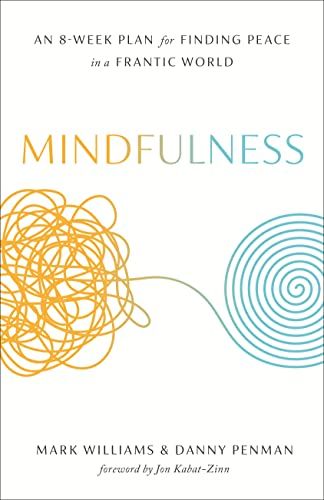Mindfulness: An Eight-Week Plan for Finding Peace in a Frantic World – J. Mark G. Williams

Discover peace and tranquility in a hectic world with this eight-week mindfulness plan. Uncover practical exercises and insights to help you reduce stress, enhance relationships, and achieve a sense of well-being.
Understanding Mindfulness
Mindfulness is the practice of intentionally being present in the moment, without judgment.
It’s a way to cultivate awareness, gain insights, and foster emotional well-being.
Practiced regularly, mindfulness can help counter the negative effects of stress and improve mental health.
Managing Stress and Anxiety
Mindfulness teaches to respond to stressors and challenges with a greater sense of clarity and balance.
By observing thoughts and emotions without getting caught up in them, individuals can make better decisions and remain grounded even in difficult situations.
Relapse Prevention
For individuals recovering from stress, anxiety, or depression, practicing mindfulness regularly can help prevent relapses into unhealthy thought patterns or behaviors.
The skills acquired through mindfulness help in recognizing the signs of a potential relapse and take appropriate action before it becomes overwhelming.
Maintaining Mindfulness Practice
The key to long-term benefits of mindfulness is maintaining a regular practice.
Cultivating an attitude of curiosity and non-judgment towards one’s own experience can help sustain motivation and ensure continued growth in well-being and emotional resilience.
Meditation Practice
Meditation is a key element of the eight-week plan.
It involves sitting quietly and focusing on the breath, bodily sensations, or other objects of attention.
Meditation fosters the ability to observe thoughts and feelings without getting caught up in them, helping to develop mental clarity, emotional stability, and self-compassion.
The Importance of Breathing
Breathing is a cornerstone of mindfulness practice.
Learning to focus on the breath and regulate it can help to center the mind, reduce anxiety, and foster emotional resilience.
An exercise in the book, called the Three-Minute Breathing Space, can be done anywhere and helps to quickly reconnect with the present moment.
Cultivating Kindness and Compassion
Kindness and compassion are essential qualities to foster through mindfulness practice.
Developing self-compassion enables an individual to respond to their own suffering with warmth and kindness instead of harsh self-judgment.
Loving-kindness meditation is one way to cultivate this skill and build emotional resilience.
Improving Relationships
Mindfulness can have a profound effect on relationships by helping individuals become more empathic, honest, and kind.
Practicing mindfulness in interactions, such as really listening to others without judgment, can lead to deeper connections and more satisfying relationships.
Mindfulness and the Brain
Mindfulness practice can physically alter the brain’s structure and function.
Research has shown that regular practice can lead to increased gray matter density in the hippocampus, which is responsible for learning and memory, and reduced activity in the amygdala, which plays a role in stress and anxiety.
The Eight-Week Plan
The book presents an eight-week plan to help integrate mindfulness into daily life.
Each week focuses on a specific theme, such as automatic pilot, dealing with barriers, and practicing acceptance.
Different mindfulness exercises, like meditation or body scan, are introduced each week and practiced regularly.

